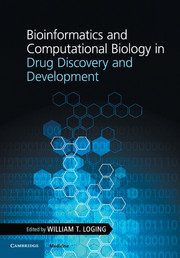Book contents
- Frontmatter
- Contents
- List of contributors
- Foreword: The future of drug discovery and healthcare
- Acknowledgments
- 1 The art and science of the drug discovery pipeline
- 2 Computational approaches to drug target identification
- 3 Understanding human disease knowledge through text mining
- 4 Integrating translational biomarkers into drug development
- 5 Computational phenotypic assessment of small molecules in drug discovery
- 6 Data visualization and the DDP process
- 7 Information visualization – important IT considerations
- 8 Example of computational biology at the new drug application (NDA) and regulatory approval stages
- 9 Clinical trial failures and drug repositioning
- Appendix I Additional knowledge-based analysis approaches
- Appendix II Open source tools and public data sources
- Index
- Plate section
- References
1 - The art and science of the drug discovery pipeline
Published online by Cambridge University Press: 05 February 2016
- Frontmatter
- Contents
- List of contributors
- Foreword: The future of drug discovery and healthcare
- Acknowledgments
- 1 The art and science of the drug discovery pipeline
- 2 Computational approaches to drug target identification
- 3 Understanding human disease knowledge through text mining
- 4 Integrating translational biomarkers into drug development
- 5 Computational phenotypic assessment of small molecules in drug discovery
- 6 Data visualization and the DDP process
- 7 Information visualization – important IT considerations
- 8 Example of computational biology at the new drug application (NDA) and regulatory approval stages
- 9 Clinical trial failures and drug repositioning
- Appendix I Additional knowledge-based analysis approaches
- Appendix II Open source tools and public data sources
- Index
- Plate section
- References
Summary
The disease condition is a standard in the lives of humans worldwide. As far back as the Roman era, early investigators pondered the reason for a wide array of disorders, such as typhoid and polio. In no place was this more evident than the bubonic plagues of the Middle Ages, which are reported as causing the deaths of more than 30% of the population in Europe (Alchon, 2003). As the observational science of biology grew, individual scientists increased their understanding of the underlying causes of human illness. In the nineteenth century, scientists like Louis Pasteur made significant contributions to the human understanding of microbiology and bacteriology. Pasteur's determination to understand human illness was born of the fact that several of his children did not survive to adulthood (Feinstein, 2008), a standard occurrence preceding the advent of twentieth-century medicine. Less than 200 years ago, prior to Pasteur's discoveries, it was coarsely thought that life spontaneously generated from inert materials (Farley and Geison, 1974); this thinking gave little value to the washing of hands and other hygienic procedures. However, additional discoveries quickly followed, such as those made by innovative physician scientists like Joseph Lister, who deduced ground-breaking procedures on aseptic treatment of patients.
The fundamentals of modern drug discovery can be found as an outline to the pioneering work of both Edward Jenner and Alexander Fleming. Although occurring more than 50 years ago, their contributions to combating human illnesses have collectively saved tens of millions of human lives; work that first started with an observation – one that caught their interest (Willis, 1997). Jenner observed that milkmaids were less susceptible to smallpox, and hypothesized that their immunity was due to contracting cowpox, an illness less virulent but related to smallpox. He successfully tested this hypothesis by inoculating human test subjects with cowpox and observed that this protected them from contracting smallpox (Barquet and Domingo, 1997). In the 1700s, it was estimated that nearly half a million people in Europe were killed by the Variola virus, the cause of smallpox (Behbehani, 1983). Due, in part, to Jenner's pioneering work on smallpox vaccination and immunity, the World Health Organization declared in 1979 that smallpox was eradicated worldwide.
Information
- Type
- Chapter
- Information
- Publisher: Cambridge University PressPrint publication year: 2016
References
Accessibility standard: Unknown
Why this information is here
This section outlines the accessibility features of this content - including support for screen readers, full keyboard navigation and high-contrast display options. This may not be relevant for you.Accessibility Information
- 1
- Cited by
